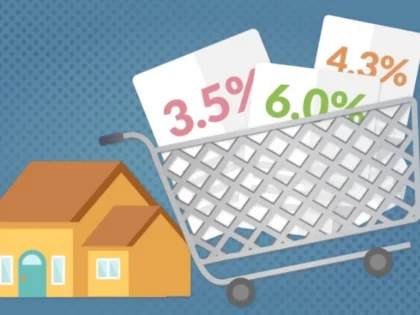The Impact Of Credit Scores OnMortgage Approvals
Whether you're a seasoned real estate investor or a first-time house buyer, knowing how credit scores and mortgage rates work will help you make better financial decisions. Credit scores are used by lenders to evaluate your risk and predict your likelihood of repaying the loan. A favorable score indicates that you handle your debt responsibly, which leads to better loan terms, including reduced interest rates.
Reduced interest rates

Better Conditions for Loans
 Lenders consider your credit score as a numerical representation of your ability to repay loans. A good score implies that you are a low-risk borrower because you have a track record of responsible credit management. Higher-score consumers usually receive better loan arrangements from lenders, including cheaper interest rates.
Furthermore, having a high credit score could make you eligible for FHA and VA mortgage loans, which are backed by the government. Compared to traditional mortgages, these loans typically have more lenient credit score requirements and are intended to assist more people in becoming homeowners.
Lenders take into account the borrower's debt-to-income (DTI) ratio, which contrasts the monthly installments of their loan with their gross monthly income, when assessing mortgage applications. Prior to applying for a mortgage, you may make more educated decisions about how to strengthen your financial position by being aware of how these aspects relate to your credit score. Paying your bills on time, reducing your credit card usage, and challenging inaccuracies on your credit report are the greatest ways to raise your credit score.
Lenders consider your credit score as a numerical representation of your ability to repay loans. A good score implies that you are a low-risk borrower because you have a track record of responsible credit management. Higher-score consumers usually receive better loan arrangements from lenders, including cheaper interest rates.
Furthermore, having a high credit score could make you eligible for FHA and VA mortgage loans, which are backed by the government. Compared to traditional mortgages, these loans typically have more lenient credit score requirements and are intended to assist more people in becoming homeowners.
Lenders take into account the borrower's debt-to-income (DTI) ratio, which contrasts the monthly installments of their loan with their gross monthly income, when assessing mortgage applications. Prior to applying for a mortgage, you may make more educated decisions about how to strengthen your financial position by being aware of how these aspects relate to your credit score. Paying your bills on time, reducing your credit card usage, and challenging inaccuracies on your credit report are the greatest ways to raise your credit score.
More Reasonable Monthly Instalments
 Credit scores play a significant role in determining mortgage affordability, even if they are not the sole criteria. A good score reassures lenders that you will pay back the loan, which enables them to provide better terms, such as lower interest rates and less stringent debt-to-income ratios.
Anyone hoping to purchase a house in the near future has to have a strong credit profile. Paying off accounts, minimizing credit card usage, and challenging inaccuracies on your credit reports can all help raise your credit score. Additionally, since making several loan requests would somewhat reduce your credit score, you should refrain from doing so.
Government-backed loans, including those from the Federal Housing Administration and Department of Veterans Affairs, typically have less strict credit score requirements than other mortgage types, making homeownership more accessible for people with lower scores. However, in order to be eligible for the best rates on traditional mortgages backed by Freddie Mac and Fannie Mae, you'll probably need a score of at least 760.
Credit scores play a significant role in determining mortgage affordability, even if they are not the sole criteria. A good score reassures lenders that you will pay back the loan, which enables them to provide better terms, such as lower interest rates and less stringent debt-to-income ratios.
Anyone hoping to purchase a house in the near future has to have a strong credit profile. Paying off accounts, minimizing credit card usage, and challenging inaccuracies on your credit reports can all help raise your credit score. Additionally, since making several loan requests would somewhat reduce your credit score, you should refrain from doing so.
Government-backed loans, including those from the Federal Housing Administration and Department of Veterans Affairs, typically have less strict credit score requirements than other mortgage types, making homeownership more accessible for people with lower scores. However, in order to be eligible for the best rates on traditional mortgages backed by Freddie Mac and Fannie Mae, you'll probably need a score of at least 760.
Reduced Requirements for Down Payment
 Another area where credit scores matter is the amount of the required down payment for a mortgage. Because lenders consider applicants with lower credit ratings to be more risky to lend money to, they usually request a larger down payment from them.
While each lender may have a different minimum credit score required to qualify for a mortgage, most lenders will accept scores in the good to exceptional range. Positive loan conditions and rates are typically available to those with good or exceptional credit scores.
However, obtaining a mortgage may be challenging or even impossible for borrowers with a poor credit score. Even if it is still possible, getting a mortgage with inadequate credit will probably come with higher interest rates and more restrictive terms. Because of this, it is imperative that prospective homeowners comprehend how credit scores impact mortgage applications and take action to raise their own.
Another area where credit scores matter is the amount of the required down payment for a mortgage. Because lenders consider applicants with lower credit ratings to be more risky to lend money to, they usually request a larger down payment from them.
While each lender may have a different minimum credit score required to qualify for a mortgage, most lenders will accept scores in the good to exceptional range. Positive loan conditions and rates are typically available to those with good or exceptional credit scores.
However, obtaining a mortgage may be challenging or even impossible for borrowers with a poor credit score. Even if it is still possible, getting a mortgage with inadequate credit will probably come with higher interest rates and more restrictive terms. Because of this, it is imperative that prospective homeowners comprehend how credit scores impact mortgage applications and take action to raise their own.








